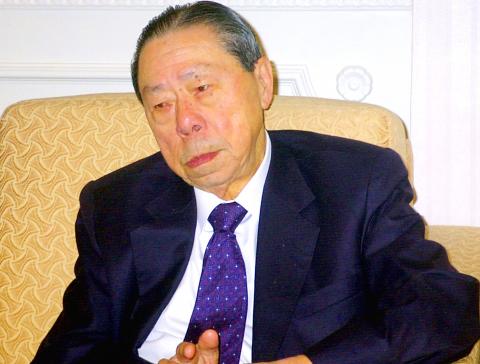Wang Yung-tsai (王永在), cofounder of Formosa Plastics Group (FPG, 台塑集團), passed away at 11:15am yesterday with family members around him, the nation’s largest industrial conglomerate announced.
Wang, who died aged 93, is a younger brother of Wang Yung-ching (王永慶), the other founder of the group.
The younger Wang was called “the grand architect” of the group’s production site in Yunlin County’s Mailiao Township (麥寮) — which encompasses the nation’s sixth naphtha cracker, an oil factory, a power plant and a harbor — because he supervised its construction, which started in 1994, the group said.

Photo: CNA
The production site generates sales of NT$1.5 trillion (US$48.54 billion) a year, an official of the group, who declined to be named, told the Taipei Times by telephone.
Last year, the group, which employs about 100,000 workers, reported revenue of NT$2.45 trillion and said it expected the figure would increase to NT$2.6 trillion this year.
Wang Yung-tsai also helped the group to develop its electronic materials business, which includes Nanya Technology Corp (南亞科技) — the nation’s biggest DRAM chipmaker — and Inotera Memories Inc (華亞科技) — which is a joint venture between Micron Technology Inc of the US and Taoyuan-based Nanya Technology.
The younger Wang was in charge of the group after his brother retired in 2002. He retired himself as vice chairman of the group in 2006, handing over the company to seven people, including group chairman William Wong (王文淵), who is Wang Yung-tsai’s son; vice chairperson Susan Wang (王瑞華), who is Wang Yung-ching’s daughter; Wilfred Wang (王文潮), William Wong’s younger brother; and Sandy Wang (王瑞瑜), Susan Wang’s younger sister.
Before Formosa Plastics Group was founded in 1954, Wang Yung-tsai and his elder brother operated rice and lumber businesses together.
“Currently the group has many important ongoing projects,” William Wong said in an e-mail yesterday.”
“We hope that everyone in the group will learn the simple and diligent style and courage of the group’s two founders to accomplish the goals,” Wong said.
Wang Yung-tsai was five years younger than Wang Yung-ching, who passed away in 2008.
Financial Supervisory Commission Chairman William Tseng (曾銘宗) and Vice Minister of Economic Affairs Bill Cho (卓士昭) expressed gratitude to Wang Yung-tsai for his contribution to the nation’s economy.

Macronix International Co (旺宏), the world’s biggest NOR flash memory supplier, yesterday said it would spend NT$22 billion (US$699.1 million) on capacity expansion this year to increase its production of mid-to-low-density memory chips as the world’s major memorychip suppliers are phasing out the market. The company said its planned capital expenditures are about 11 times higher than the NT$1.8 billion it spent on new facilities and equipment last year. A majority of this year’s outlay would be allocated to step up capacity of multi-level cell (MLC) NAND flash memory chips, which are used in embedded multimedia cards (eMMC), a managed

CULPRITS: Factors that affected the slip included falling global crude oil prices, wait-and-see consumer attitudes due to US tariffs and a different Lunar New Year holiday schedule Taiwan’s retail sales ended a nine-year growth streak last year, slipping 0.2 percent from a year earlier as uncertainty over US tariff policies affected demand for durable goods, data released on Friday by the Ministry of Economic Affairs showed. Last year’s retail sales totaled NT$4.84 trillion (US$153.27 billion), down about NT$9.5 billion, or 0.2 percent, from 2024. Despite the decline, the figure was still the second-highest annual sales total on record. Ministry statistics department deputy head Chen Yu-fang (陳玉芳) said sales of cars, motorcycles and related products, which accounted for 17.4 percent of total retail rales last year, fell NT$68.1 billion, or

In the wake of strong global demand for AI applications, Taiwan’s export-oriented economy accelerated with the composite index of economic indicators flashing the first “red” light in December for one year, indicating the economy is in booming mode, the National Development Council (NDC) said yesterday. Moreover, the index of leading indicators, which gauges the potential state of the economy over the next six months, also moved higher in December amid growing optimism over the outlook, the NDC said. In December, the index of economic indicators rose one point from a month earlier to 38, at the lower end of the “red” light.

MediaTek Inc (聯發科) shares yesterday notched their best two-day rally on record, as investors flock to the Taiwanese chip designer on excitement over its tie-up with Google. The Taipei-listed stock jumped 8.59 percent, capping a two-session surge of 19 percent and closing at a fresh all-time high of NT$1,770. That extended a two-month rally on growing awareness of MediaTek’s work on Google’s tensor processing units (TPUs), which are chips used in artificial intelligence (AI) applications. It also highlights how fund managers faced with single-stock limits on their holding of market titan Taiwan Semiconductor Manufacturing Co (TSMC, 台積電) are diversifying into other AI-related firms.